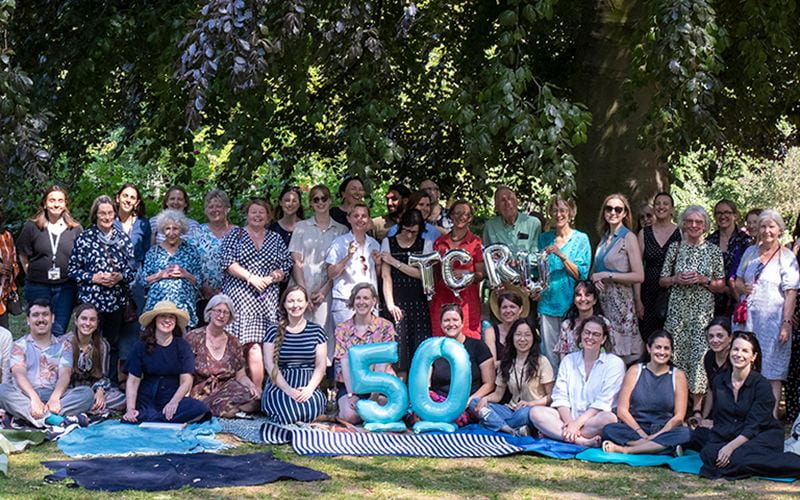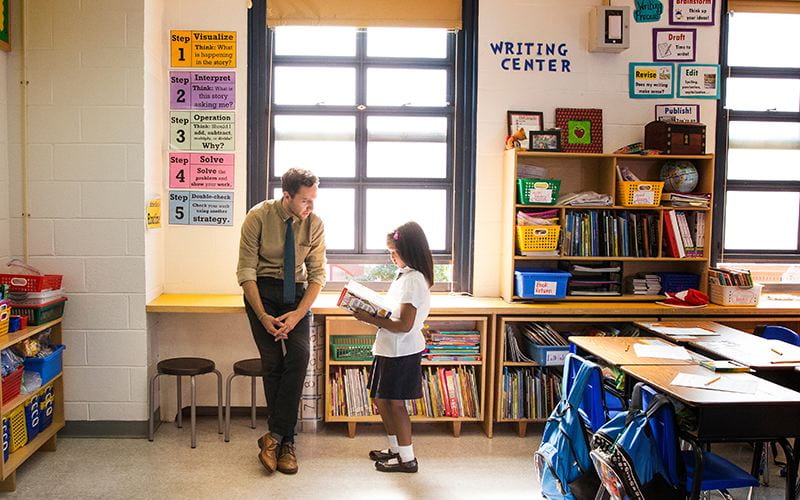Revisiting Brian Simon: a major educator in historical perspective
By Blog Editor, IOE Digital, on 14 November 2023

Technical drawing at Tottenham Polytechnic, Middlesex, England, UK, 1944 (Credit: Ministry of Information Photo Division Photographer / Wikimedia Commons).
14 November 2023
Student, soldier and schoolteacher, Communist Party activist, and educational academic, campaigner and reformer, Professor Brian Simon (1915-2002) had a distinguished public record in education which was well recognised during his career. His many publications in the history of education, including a four-volume history of education in Britain published in 1960, remain required reading in the field. He had a particular link to IOE as he trained here as a teacher in the 1930s before embarking on his career in education, and his extensive personal archive was donated to IOE after his death.
Yet it is only now, some 20 years on, that we can see him in a more long-term historical perspective as in many ways an underrated figure in 20th century Britain, whose work is Read the rest of this entry »
Policy relevant social research – looking to the future at TCRU
By Blog Editor, IOE Digital, on 9 November 2023

Credit: Culture Creative / Adobe.
9 November 2023
By Alison Lamont and Alison Koslowski
This is the third in a series of blog posts celebrating the 50th anniversary of the Thomas Coram Research Unit (TCRU) and launch of Social Research for our Times. Following Peter Moss’s reflection on the founding directions of TCRU under its first director, Jack Tizard, and Claire Cameron and Eva Lloyd’s post showing some current strands of its work, we look to the future. In particular, we examine some of the ongoing challenges facing TCRU as we continue to work on delivering research with the strategic aim of informing policy. New, but quickly familiar challenges emerge: the slippery question of ‘impact’ and how to get research findings into the right hands at the right time, as well as the age-old fight to secure funding, now in a ‘post-Brexit’ landscape. In the conclusion to Social Research for our Times we consider these in connection with the local challenge of sustaining our research identity and our research. We focus on a) how we communicate our research findings, and to whom; and b) how we strengthen links with existing and prospective partners, especially now with European partners.
This post explores two modes of working that are already in action among TCRU colleagues and are promising avenues for building the Unit’s policy relevance. Read the rest of this entry »
Understanding the care workforce crisis: a research-policy relationship
By Blog Editor, IOE Digital, on 2 November 2023

Credit: Cavan via Adobe Stock.
2 November 2023
By Claire Cameron and Eva Lloyd, Visiting Professor, UCL
A growing research literature has demonstrated that positive experiences early on in life are associated with more positive adult outcomes, so investing early is key for societal wellbeing. Central to this is the children’s workforce, from health visitors to early childhood education and care practitioners and social workers. In a newly published edited volume from past and present TCRU researchers, Social Research for our Times (UCL Press), we examine how social research and policy can interact (or not) to achieve progressive objectives for children and the professionals who provide their care. Whether the research is ‘strategic’ (with a longer-term orientation) or ‘tactical’ Read the rest of this entry »
The Thomas Coram Research Unit at 50: looking back to look forward?
By Blog Editor, IOE Digital, on 31 October 2023

Credit: Mary Hinkley for UCL.
31 October 2023
By Peter Moss
In a contemporary context of profound transitions and converging crises, it seems time to reconsider and reprioritise the role that social research can play in creating public policies, including services, that are relevant to rebuilding a world that is more just, more democratic, more sustainable and more caring. In this scenario, strategic social research, including an element of experimentation, may have a major part to play in what has been described by one commentator, Geoff Mulgan, as ‘expand[ing] our shared possibility space, the options for our societies… to populate our fuzzy pictures of the future with complex, rich, plausible [i]deas, pictures of the possible’.
Such concerns and such an approach are not new; they were founding principles of the Thomas Coram Research Unit (TCRU). They have, though, not always been easy to sustain. As TCRU marks its 50th anniversary, it is an important moment to reiterate that broader Read the rest of this entry »
Can we level the social sciences playing field? Reflections from CLS’s first-ever summer school
By Blog Editor, IOE Digital, on 24 October 2023

Credit: Annanahabed / Adobe.
24 October 2023
The year 2023 marked many things: the coronation of the UK’s new King, the coinage of the term “Barbenheimer”, and, perhaps most importantly, the inaugural Centre for Longitudinal Studies (CLS) Year 12 Summer School ‘Harnessing the power of longitudinal research for policy impact’.
Our motivations behind the summer school were twofold: to contribute to widening participation efforts in general across the higher education sector, and to support greater diversity in the social science researcher pipeline. Our experience showed the real potential of programmes that give under-represented school students the opportunity to work directly with university departments on scholarly research, especially when that is over an extended period. Such programmes can make a distinct contribution to showcasing that university is a realistic, and hopefully desirable place for young people to be. They can also be incredibly rewarding for the academics who lead them. Read the rest of this entry »
How should research, policy and practice interact in the interests of education?
By Blog Editor, IOE Digital, on 16 October 2023

What Matters in Education series from the ESRC Education Research Programme.
16 October 2023
By Gemma Moss
In the run-up to the next general election, each of the political parties is beginning to set out what they see as the key issues in education and what they would like to change. This is a good moment to review the extent to which party-political priorities reflect concerns widely shared by the general public, the practitioner community and the research community – and the role the research community might have in helping to shape that debate. Just how research, policy and practice can best interact are live questions for the social sciences. Read the rest of this entry »
What works for teaching phonics, reading and writing?
By Blog Editor, IOE Digital, on 12 October 2023

Credit: Vectorfusionart / Adobe
12 October 2023
By Dominic Wyse
This is the third of three blog posts about the teaching of phonics, reading and writing. The approach of this blog series is characterised as ‘A Balancing Act’:
- Understanding the PIRLS 2021 results;
- England’s narrow approach to phonics teaching;
- What works for phonics, reading and writing.
The Balancing Act: Part 3
Research published to date strongly suggests that the most effective way to teach phonics, reading and writing is a balanced approach – one that carefully combines different aspects of reading and writing in all reading and writing lessons. For example, when children are age five to six there would be a clear emphasis on phonics, but this would not be taught as separate synthetic phonics lessons, nor would the emphasis on phonics unduly dominate the other important aspects of teaching reading such as comprehension, motivation for reading, engagement with real books more than decodable books, etc. A balanced approach to teaching reading and writing is not the same as the synthetic phonics-led approach currently enforced in England Read the rest of this entry »
England’s approach to teaching reading is too narrow
By Blog Editor, IOE Digital, on 11 October 2023

Credit: Cavan for Adobe
11 October 2023
By Dominic Wyse
This is the second of three blog posts about the teaching of phonics, reading and writing. The approach of this blog series is characterised as ‘A Balancing Act’.
- Understanding the PIRLS 2021 results;
- England’s narrow approach to phonics teaching;
- What works for phonics, reading and writing.
The Balancing Act: Part 2
In order to judge if England’s approach to teaching reading is narrow or not, we need a clear picture of what typically is happening in primary school classrooms. We also need a clear picture because some commentators may claim that England’s approach is not narrow. Although we lack large-scale independent evidence of observations in classrooms, by combining teacher survey data with the details of statutory policy and related requirements it is possible to identify aspects that are part of England’s approach.
The list below needs to be understood as a whole because it represents multiple policy levers Read the rest of this entry »
Teaching synthetic phonics and reading: PIRLS of wisdom?
By Blog Editor, IOE Digital, on 10 October 2023

Credit: By-studio / Adobe Stock.
10 October 2023
By Dominic Wyse
This is the first of three blog posts about the teaching of phonics, reading and writing. The approach of this blog series is characterised as ‘A Balancing Act’:
- Understanding the PIRLS 2021 results;
- England’s narrow approach to phonics teaching;
- What works for phonics, reading and writing.
The Balancing Act: Part 1
In an article in the Telegraph newspaper in May 2023 the Minister of State for Schools, Nick Gibb MP, claimed “Our ‘obsession’ with phonics has worked”. The claim was based on his interpretation of the Progress in International Reading and Literacy (PIRLS) 2021 study published earlier this year. The minister’s main point was that “England was fourth out of 43 comparable countries” because apparently teachers had “embraced phonics”. England’s average scale score in PIRLS 2021 was 558, compared to a score of 559 in the previous round, in 2016.
Lucy Diggs Slowe and the ‘New Howard Woman’
By Blog Editor, IOE Digital, on 3 October 2023

Street sign of Lucy Diggs Slowe Way, Howard University. Credit: Justin D. Knight/Howard University.
3 October 2023
By Sandra Leaton Gray and David Scott
On 22 October 2021, Howard University honoured the American educator Lucy Diggs Slowe by naming a street after her at 2455 4th St NW, Washington DC. The designation ceremony was led by Mayor Muriel Bowser, a Howard alumna herself. Phylicia Rashad, Dean of the Chadwick A. Boseman College of Fine Arts, asked the question: “What was that impetus, what was that spirit inside that young woman? This faith and confidence and belief in herself? … What I am really excited about is discovering that same spirit within our young women on this campus today. And bringing them to that realisation within themselves of who they are in spirit. Confident. Aware. Capable. Strong. Intelligent. Prepared to inspire the next generation, the next generation, the next generation. Because this is what we do, this is how we are, and this is how we stay.” Read the rest of this entry »
 Close
Close


